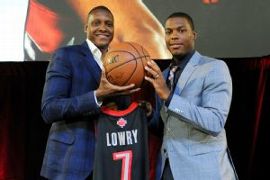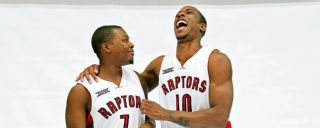|
When the NBA playoffs began last season, the city of Toronto was brimming with excitement. The team that was supposed to sacrifice its season to the draft gods in hopes of landing Canada’s own Andrew Wiggins, the one that traded away its most expensive player in early December, reached improbable heights in 2013-14 -- a franchise-best 48 wins, a No. 3 seed and sending one player (and almost a second) to the All-Star Game for the first time since Chris Bosh left for Miami. Now Raptors general manager Masai Ujiri was dropping F-bombs in public. Maple Leaf Square -- a sports mecca outside the Air Canada Centre -- became “Raptors Square.” Fans flocked there during away games, noticeably more energized than the home crowd. Even Kevin Garnett thought so. In the end, the Raptors’ first postseason run since 2007-08 ended on a dour note. Kyle Lowry’s last-second floater was blocked by Paul Pierce, and the Brooklyn Nets escaped Game 7 in Toronto with a one-point win. A comeback in the waning minutes, with all the momentum of an inconceivable season behind it, would be for naught. To feel the spoils of an entire season culminate and evaporate this way, in the singular flash of one final play, makes for a heartbreakingly tough way to go out. Especially when that could’ve been it. That one play might have closed the books on this fun, started-from-the-bottom (I’m sorry, I really am) run. With the contracts of several key contributors up for renewal, and doubts about the lasting power of the roster they’d ridden up the diluted Eastern Conference lingering, these Raptors could have just been another thread in the franchise’s long line of first-round flameouts. That’s the kind of thing fans were used to, anyway. Faced with the tall order of not only retaining their good players, but keeping the club on an upward trajectory, the franchise with only seven winning seasons in 19 years achieved something decidedly un-Raptor-like: It succeeded. Lowry, the team's floor general and emotional leader, re-upped for four more years. Patrick Patterson and Greivis Vasquez, who arrived in the Gay trade, stayed, too. This was all pretty new to Toronto basketball fans. For almost two decades they had been constantly reminded of the long list of reasons not to play there: It’s too cold. Taxes are too high. Not enough publicity. And why doesn’t League Pass work? Canada, ugh. Fans operated under the assumption that things would always have to be this way. That’s why the reaction to Lowry’s return was met with a mix of awe, relief and gratitude. Now, as the franchise normalizes, getting familiar with operating within the trappings of a regular playoff team -- the weight of expectations, balancing high hopes with definable limitations -- it’s no coincidence that phrases such as “internal development” and “continuity” reached a high point of concentration at Raptors training camp. “You don't have to do so much of teaching, learning new things,” DeMar DeRozan said. “You start off from last year. Everybody already understands coach [Dwane] Casey, understand his philosophy. It makes it easier. All the guys that were here last year understood what it took for us to get to the point we were last year. We gotta take that next step as well if we wanna continue to be a great team.” None of this is to say it isn't reasonable to pick at the Raptors’ offseason approach. They are, after all, locking in on this team for the foreseeable future. But while the notion of continuity-as-progress is often just hot rhetoric used to put a spin on standing pat, it might carry some real benefits for a developing team like Toronto.  “The seed is there a lot quicker than it was last year," said coach Dwane Casey. "I love some of the options we have at the end of the game now. We're farther down the road, working on more intricate things. Double team schemes, things like that. We're farther ahead from a defensive standpoint. We’re farther in terms of knowledge.” “The seed is there a lot quicker than it was last year," said coach Dwane Casey. "I love some of the options we have at the end of the game now. We're farther down the road, working on more intricate things. Double team schemes, things like that. We're farther ahead from a defensive standpoint. We’re farther in terms of knowledge.”
In response to Casey praising his playmaking, DeMar tipped his hat again to team chemistry. "At the end, it's just personnel, understanding my teammates. If Landry's in there, he likes to cut. I'll make a move if the double comes, I'll look for Landry on the cut. I think it helps me more just to understand my teammates.” None of this is electrifying, nor is it certain. Schematic improvements, breakout seasons, freak injuries, inexpiable collapses, incremental improvements -- it’s all what-ifs before the first tip-off. Toronto could make good on its potential. Or maybe last season really was the high-water mark. But just being in that position marks a cultural sea change, the beginning of a process that should long outlast this group of players. In a free-agency market featuring more player movement than ever, the Raptors -- for the first time ever -- look like an attractive destination. Last year, Toronto overtook Chicago in population, making it the third-largest city with an NBA team (and that doesn't account for the rest of Canada). It touts one of the most energized fan bases in the league. Drake hangs out there a lot. Plus, Kevin Durant is signing with the Raptors in 2016. Seriously. Ask Drake about it. Under the best of circumstances, the Raptors’ path from good to great still probably stops a few kilometers short of a championship. But success is a process, and improving the future requires investing in it. “People always put a ceiling on all of us, as players. 'You only can be this good' or 'when you get this age, you only can be this good.' I don't look at nothing like that,” DeRozan said. “There's always something you can get better at, and you can take that same approach in life. There's always something out there that you can work on. I never could be great at everything, but I'm gonna work at everything to be good at it." Having a ceiling is nothing to be cynical about. It’s just a natural byproduct of getting off the floor. Seerat Sohi writes for the TrueHoop Network. Follow her @DamianTrillard.
|

